The Jury’s still out on whether humans respond to incentives, but it’s clear that some species do.
I see dead people (but not racists)
Many voters are reality invariant, they say things about who they are rather than the world they live in.
In the US, more whites believe they have touched a ghost than believe blacks are discriminated against a lot. I would consider this a good example of people being reality invariant. Needless to say there’s ample evidence of racism, and little of ghosts, but note that these beliefs are treated differently.
Reality invariant voters are sometimes paid attention to, and sometimes not. It’s not enough to blame policy errors on politicians pandering to the reality invariant. When and where they’re tolerated or ignored tells us a lot too.
One reason there are racist policing policies is that white voters in America don’t realise they exist or pretend they don’t. But there are no ghost friendly policies to the same degree despite comparable levels of reality invariance.
Some of this is because the fish is the last to know the water. Many Americans have swam in racism so long they don’t see it. Another is that there is no institutional outlet for supporting ghost based policies unlike those for racism.
I think the idea of a reality invariant electorate is important, but it’s not nearly a complete theory, as the above example shows. History, path dependence and institutional capability and development all play a role in whether these reality invariant voters are catered to or not.
Poor people are not reality invariant, give them your money
On Monday I wrote about the reality invariant. Often these people are reality invariant because they can afford to be wrong. Nothing too bad will happen. They won’t be brutalised by the police if they crack down on non-existent crime. They won’t be detained at the border. They won’t discover themselves poor.
Some people can’t afford that level of detachment, people who are poor. In fact often they have few views on policy, they’re too busy. That’s poor people and they’re very practical. That is why I support Give Directly, a charity that gives money directly to poor people, no strings attached.
I’ve written about them on a number of occasions. Just search this blog for more. They find poor households in Kenya and Uganda in areas which have a mobile payments network and give them money. This seems personally the least patronising way of helping people and ideologically the most appealing to me.
But am I being reality invariant? Am I giving poor people money because I want to feel empowering and it reflects my anti-bureaucracy instincts? Well, as it turns out no. I was right all along. Which is a relief. As well as doing regular audits of measured outcomes the Give Directly people also speak to recipients and ask what they want.
It turns out they do want cash. If an NGO offers you a free cow shed you’ll say yes, but if you have the money yourself you might find it makes more sense to buy a water purifier. But if the purifier people are in the village next door and the cow shed people are in town, fuck it, have a cow shed. Why not?
That’s the story Give Directly tell (without the swearing, I added that, for colour) about why they’re efficient. And Give Directly are efficient, but efficiency isn’t all there is to life. Turns out its not just efficiency that the poor need. Giving them money may sound infantalising or like it would breed dependency but that is not the case. Recipients tell a totally different story.
Being given money means that goods which are bought are more valued. If you end up with a cow shed or a water purifier it is because you really wanted one. Rather than infantalising you, being given money is empowering. These aren’t lazy people, they’re often working constantly so the money gives them the power to respond to shocks and gives them the dignity to set their own standards. Rather than buying one big off the shelf NGO supplied thing recipients can shop around for the items they really want.
These people are empowered by money. Commerce and money are great liberators. Luckily a lot of evidence is building up that proves this and that also proves it is an easy gift for you, dear reader, to give. So if you are thinking about supporting a charity, and I believe lots of people are at the moment, then consider donating to Give Directly.
___
Photo above taken from Give Directly’s 2013 report.
Making policy for the reality invariant
I like to call a lot of voters reality invariant. I’m definitely not saying they’re stupid, just that their opinions are reflections of their internal world, and are invariant to reality. Policy makers are treating these signals as true statements of their view of the world and want to change the world to satisfy them. Because some people are reality invariant this is doomed to fail. This is my suggestion for the converse of the Lucas critique.
The Lucas critique says that policy made using past observations won’t be effective. If you change policy from that which produced the predictions you’re using to change policy, the policy change won’t work as expected. Imagine FIFA is corrupt (!) and a team bribed it to make headers worth double, because in past competitions it would have advantaged them. Because rules change in a predictable way any previous advantage might vanish as other teams adjust their playing style.
In contrast, voters being reality invariant mean policy changes won’t work because people don’t care about policy. If you make policy to change a real outcome people say they care about but don’t, then a effective policy won’t be successful. You’ll change the targeted outcome, but not please voters. This can be misinterpreted as failing and so policy must double down on reality, even as the reality invariant remain oblivious.
One of the most obvious is immigration. For many people around the world national immigration controls are not an issue. Around 10% of people think it is an issue at any one time. In the UK, that figure is around 45%.
This is despite British people agreeing with the rest of the world about their local area. Britons think that immigration is a huge problem nationally, but if everyone went and visited each other they would find out it isn’t.
For over a decade tighter and tighter immigration acts have been passed to the point where the immigration question has been solved. Short of Ukraine or Turkey joining the EU, or the UK leaving, immigration controls cannot get any tighter. And yet the British public are still not satisfied. [1]
It’s that second graph you should worry about if you’re a policy maker. The British don’t care about immigration. They care about the perception of immigration. British politicians have been very effective at reducing immigration. Only 1% of those who want to enter do so. The public don’t care.
They’re reality invariant. You can change reality but it will have no effect on their voting habits or opinions. You can lament the rise of spin, and I do!, but there’s a reason it’s so important. We’ve reached the effective limit of immigration restrictions and the public are still not satisfied.
Inequality is another area where people are reality invariant. Various policy changes have turned the US into a more unequal country, even as European states have held of the worst excesses of liberalisation. The FT have results of a survey that shows nobody understands how unequal their country is. Americans believe their country is more equal than it really is, and Europeans think their countries are more unequal than they really are.
“The results of the study suggest that, in the political debate on income distribution, it is often not the facts that count but [perceptions],” says Professor Michael Hüther, director of the Cologne-based IW economic institute, which carried out the research.
In Hungary belief in widespread poverty is supporting the growth of Jobbik and Hungary’s slide into fascist politics. In America belief in egalitarianism prevents help going to the poor. The voters are reality invariant, they are discussing how they feel about reality, not reality.
Crime is the most famous example. Fear Of Crime™ is a major issue. Crime just isn’t.
The reality invariant voter looks at this and sees fiddled numbers. By 2007 crime was the number one concern for British voters, briefly displacing “immigration” before being engulfed by “the economy.” Despite violent crime falling in half, fear of crime continued to increase.
War is the last area I want to briefly touch on. War, what is it good for? Absolutely nothing, until it’s useful for absolutely anything. Intervening somewhere is a very bad idea, until it isn’t:
It doesn’t matter, how many times your Yazidis get off the mountain without significant UK aid or an entirely theoretical artillery seige of Bengazhi with rapacious house-to-house murders turns into an actual, person-killing, NATO-supported, civilians-running-everywhere seige of Sirte. There’s always some compelling reason why this war, this intervention, this bombardment, is radically different to all the other invasions and occupations and airstrike campaigns, and why the horrible news always means that there’s no time for rational thought this time before we start blowing that shit up.
I’ve come to you with a problem, and a snappy term to describe it. Traditionally this is where a writer would offer a solution. But not me. Lucas didn’t have a solution, he had a critique. I am also merely pointing out that policy is today being made foolishly. The assumption of policy makers that changing reality will have the desired effect is based on a faulty model. It is a very rational model, but the model is wrong nonetheless. Lots of the public are reality invariant, and you can’t make policy presuming they’re not.
______
[1] As Chris points out, the reality is that these policies kill and kill intentionally and purposefully. But this is also a reality most people ignore.
Sex and coal
Reading the below and Lori Adorable I was reminded of an old Chris Dillow post, coal not dole. What would happen if Sweden were successful and ended demand for paid sex?
For one crazy minute, consider the possibility that women are people & not things that you can purchase a single-use licence to penetrate.
— Sarah Ditum (@sarahditum) August 8, 2014
Some say sex workers will find other work, Lori says this is ridiculous. Lots of sex workers say we need to end violence, not demand. I say, because I’m a bit weird, what’s the evidence from Britain’s coalfields?
Since the beginning of the 1980s the British coal industry has lost around a quarter of a million jobs, largely because demand for coal from deep mines vanished. The analogy isn’t great, but it crossed my mind and I haven’t had a decent idea for a blog post in five months. Sue me. So, it turns out, of the 213,000 mining jobs lost since 1985, 90,000 have not been replaced. The miners were promised that Thatcher’s glorious entrepreneurial Britain would find them new jobs. It did not.
The market failed Britain’s old labour aristocracy and the state did little better. When Thatcher’s job machine stalled at Watford Gap Blair’s public sector investment helped. Of the 90,000 jobs created, many came only because of intensive investment by local authorities, development agencies, central government and the European Union. More than half of these 90,000 jobs were created since 2001.
If demand for something disappears it should reappear somewhere else. But that doesn’t mean those left without work will benefit. It might be easy to assume the market will allocate labour effectively if a job disappears, but much of the evidence we have suggests otherwise.
Miners were economically organised, politically powerful, physically healthy and ultimately received significant investment in jobs. Despite all this communities remain scarred to this day. What would be the result of a end to demand for sex workers who are more politically and economically isolated, more absent from the media, and often physically and mentally unable to do other work? I’ve had five months off, so I’m a little rusty. I will leave the rest of this nasty little thought experiment as an exercise for the reader.
What if the immigration debate ended but nobody noticed?
There is no difference between the parties now. I know that sounds like the hyperbole of a political try-hard, but I think it’s true. In the early 2000s Labour solved the problem of asylum seekers and it took everyone a long time to realise. At some point in the last few years the problem of European migration was solved and people still haven’t noticed. The rhetoric will vary but the UK’s immigration policies for the next generation are set. Unless the UK leaves Europe we know what immigration policy is going to look like.
In the early late 1990s, southeastern Europe tore itself apart and refugees started to appear in the UK. Labour passed lots of laws that stripped refugees of their rights. It worked, but Labour get little praise for their achievement.The numbers of asylum seekers in the UK sank from 84,130 in 2003 to under 20,000 from 2009 onwards. The asylum seeker question is settled. They should be prevented from arriving, but if they make it here we don’t let them work, give them the worst housing and £5.23 a day each for food, sanitation and clothing.
Despite the number of refugees staying high globally, Labour successfully helped the UK dodge its internationally responsibilities towards the world’s refugees. Labour don’t get any thanks from the Tories or Lib Dems but everyone is a Blairite now when it comes to asylum policy. There are no suggestions we weaken sanctions or accept more refugees, the matter is dead. All eyes are on the politics of European migration.
In 2004 the UK, Ireland and Sweden opened their borders to the A8 ex-communist states, the rest of Europe waited to see what happened. We received not 10,000s of migrants as predicted, but 100,000s. Just as the asylum problem was “solved” a new front opened. Europe, specifically poor Eastern Europe, is the political problem and as John Rentoul points out, there’s very little between the main parties on migration. At Question Time on Thursday Rachel Reeves and Michael Heseltine both banally agreed it had been a mistake to let in the Poles.
Just as the asylum problem was solved and nobody noticed so has the problem of European migration. If in 2017 we vote to leave the European Union then we will see a drop in migration. Much more likely though is us staying in Europe and accession states having their free movement restricted. How this policy will manifest is difficult to predict but each party will follow a similar line. Migration will stay in the low 100,000s because the UK, for all its faults, is much better than most other places and we won’t leave the EU. Asylum Refugees will remain betrayed and politically unimportant and non-EU migrants will remain able to move here for family reasons or if they’re rich, well educated and have a corporate sponsor.
People will keep moaning about immigration, but “Europe and immigration” now means “what do we do with Ukraine and Turkey.” Geopolitically Europe wants them in their sphere of influence but don’t want to deal with over 100 million new European citizens. On immigration the parties are agreed. On geopolitics too they want Turkey and Ukraine to be in the European sphere of influence. Managing this will be a huge challenge but its a very different immigration debate to the one we’ve been having for a decade and a half. That debate is over but I’m not sure anybody has noticed.
The main reason I don’t believe the Iranians
Nuclear weapons are great. But why on earth would you want a civil nuclear energy industry?
The Tories are very good at controlling our border
So are the Labour Party. In fact, the British state is excellent at controlling our border, if you mean keeping people out. They are so secure that word has got around and most people don’t even bother trying to get in. Berghain has a reputation for exclusivity, but it is nothing like as selective as the British state.
One of Parliament’s least pleasant anti-immigrant, anti-science libertarians published this earlier:
SW1 gang talk about controlling the weather. They can’t even control our borders
— Douglas Carswell MP (@DouglasCarswell) February 16, 2014
Climate change denial aside, the comment on controlling our borders really rankled. Sure, lots of people have moved to the UK in the last decade, but a lot less than would like to. Douglas Carswell is pretty deluded if he thinks it’s only Poles, Bulgarians and Romanians who want to move to the UK.
Gallup conducted a survey in 2007. Doubtless it’s a little out of date now, but it’s still useful. They asked where people would live if they could live anywhere in the world. They constructed a representative data set and worked out how many people worldwide wanted to move where. The US came top, as you’d expect, and the UK came second. [1]
150 million people want to move the US and 45 million want to move the UK. That will be a conservative figure as some people would move the UK were it the only option realistically open to them.
So how many people actually make it into the UK? Well, to be fair I’ll use gross migration and include Brits who are just coming home. Net migration is the common figure, but it subtracts those leaving from the gross figures. I want to use the most upwardly biased figure possible. So, for good measure, I’ll take the gross number from Migration Watch: 503,000 by their reckoning.
45 million people want to move here (conservatively) and (as an upper bound) 503,000 actually did last year . That means every year just 1% of those who want to move the UK actually can and do. This figure isn’t meant to convince anyone who doesn’t already agree, but just so you know, anyone who says the British state can’t control its borders is a fucking idiot, Douglas Carswell included.
____
[1] If that fills you with dread rather than pride you’re a weirdo.
The Swiss are restricting immigration, but that doesn’t mean immigration restrictions are back
Switzerland just narrowly passed a referendum to restrict immigration. Prior to the 1990s Switzerland operated a quota system and many people could only work in the country for nine months before having to leave. Europeans have long enjoyed the right to live and work in Switzerland but it seems like a return to the old, more restrictive set-up is certain.
Switzerland is one of the most open countries in Europe. As a small manufacturing economy it has to be, it relies on trade, transport links and labour from the rest of Europe. Similarly, as a small country it has to import footballers. Say hello to the new Swiss national squad.
I don’t have any intention to live or work in Switzerland nevertheless I find it sad when a country restricts the right of people to work. and live where and how they want. Its especially galling as the areas with least migration voted most strongly to restrict it. I don’t know much about p values but I know a sloped line when I see one.
There’s also a helpful map if that’s more you thing. The south of the country is Italian speaking and has lower (but still non-negligible) migrant populations. The west (Geneva) and north (Zurich) have lots of foreigners. Those with least experience with migrants voted to reimpose restrictions, those with the most experience voted to continue open European borders.
A similar pattern reproduces itself in the UK. Areas with the fewest migrants are the most likely to wish to see it curtailed. Those with the most neighbours from another country were the least likely to want to see further migration curtailed. The same pattern prevails in the US. If you presume migration is a bad thing this is counterintuitive. If you presume it is a good thing this makes perfect sense. I do have a graph, since you ask, here it is.
This isn’t just a historic thing, even in areas that saw the fastest change in the mid-2000s, the white british population were less likely to want to see immigration reduced. However, as you can see, less restrictionist is still quite restrictionist: more than half of the most sympathetic still want immigration reduced.
That’s from IPSOS-MORI’s excellent paper on perception and immigration. Enough meat there for everyone to find something of interest. Do stop reading my blog and download the pdf, I shan’t be offended. Bryan Caplan thinks more immigration is the answer to anti-migrant sentiment. Tyler Cowen thinks that plan has run its course. I’m not so sure.
A few tens of thousand swiss votes the other way and we would be having a different discussion. Until now Switzerland has been the most immigrant tolerant nation in the world – I don’t count Luxembourg, because, seriously, who does? It may have banned Minarets but it homes 300,000 Kosovan muslims.
Switzerland accepts an immigrant inflow equivalent to 1.5% of its population each year. The UK would have to accept double this number of gross migrants to even come close. Even with restrictions Switzerland is likely to accept levels of migration well above the rich country norm. Good for the Swiss. Three cheers for them, even now.
Iain M Banks on Immigration
I strongly suspect the things people believe in are usually just what they instinctively feel is right; the excuses, the justifications, the things you’re supposed to argue about, come later. They’re the least important part if belief. That’s why you can destroy them, win an argument, prove the other person wrong, and they still believe what they did in the first place.
Iain M Banks Use of Weapons
Well, not actually Iain, and not about immigration, but you get the idea.
Do addicts need help…
…or do narcissists need mocking?
IN my last year on Wall Street my bonus was $3.6 million — and I was angry because it wasn’t big enough. I was 30 years old, had no children to raise, no debts to pay, no philanthropic goal in mind. I wanted more money for exactly the same reason an alcoholic needs another drink: I was addicted.
Our Galtian Overlords ladies and gentlemen… And oh it gets better…
The first year was really hard. I went through what I can only describe as withdrawal — waking up at nights panicked about running out of money, scouring the headlines to see which of my old co-workers had gotten promoted. Over time it got easier — I started to realize that I had enough money, and if I needed to make more, I could. But my wealth addiction still hasn’t gone completely away. Sometimes I still buy lottery tickets.
What bizarre behaviour, worrying about money and occasionally gambling, I’m sure none of my readers could possibly sympathise.
Great sentences of our time: sex-selective abortion bullshit edition
It is pretty obvious here that the Indie’s entire article stems from what has to be easily the most spectacularly misconceived and shoddily executed fishing expedition since Captain Ahab went off chasing Moby Dick – and yes, I know that’s fiction, but then so is Indie’s entire fucking analysis.
Unity on blazing form: read his take of the Indie’s sex-selective abortion nonsense.
.@Give_Directly to 1,300 Poor Households in Kenya
Give Directly are my favourite charity and they should be yours too. They give money to poor people. Not just any poor people, but really poor people in East Africa. There’s a minimum of bureaucracy and they are innovating new ways to remove the bureaucracy which currently exists. It is simplicity itself, and it works. And you can donate this month and double your donation.
Supporting Give Directly gives you the warm glow of helping the most needy people imaginable, but more importantly it also gives you the warm glow of having your ideological predispositions confirmed. If you’re anything like me you just can’t beat it. Donate and you too can bask in the heroin-like glow of confirmation bias.
They regularly audit and they get amazing results. Business and agricultural income increased 28% of the average grant size, implying a 28% annual rate of return. With a doubled donation you’ll be getting a 128% rate of return. Plus mental health improves, crime and conflict doesn’t change, it doesn’t cause localised price inflation and it reduces domestic violence and increases female empowerment.
They’ve also begun using community-based targeting: in a subset of villages, they got the community to help them categorize households by poverty level. Wherever there’s cost and bureaucracy they’re looking for ways to remove it. Wherever there is local knowledge they’re looking to use it. So far:
- Most people think housing materials are the best indicator of poverty — reaffirming the criteria we already use. Furniture and source of income were also popular.
- People generally agree on how to apply the housing criteria. When we asked communities to categorize each household as “rich” or “poor”, they agreed in 9 out of 10 cases.
- Engaging local leaders in the process can help, but also raises a risk that they will ask for “compensation” for tasks they are supposed to do for free.
Honestly, if you’re not supporting this charity (I think this would particularly suit Jackart, Chris and Frances) I don’t know what’s wrong with you. Oh, and they have no marketing budget, so yes, you will have to put up with regular half press release, half begging letter posts here, essentially, forever. Or until we end poverty. So its up to you really.
Will Half The UK Be Obese Before 2050? Are The Press Credulous Nincompoops?
No. Yes. For fucks sake, what is wrong with the media? Lots, I suppose, but I’ll concentrate on their innumeracy and credulousness for now. I will also cover their prejudice and scientific illiteracy. Which is a lot to do in under 1000 words, but when you’ve such densely packed stupidity as our Obesity Crisis Bleughly etc. you can really go to town.
First, a little history lesson: in 2007 a report commissioned by the government stupidly predicted that if people continued getting obeser at the same rate by 2015 36% of males and 28% of females would be obese. By 2050, 60% of males and 50% of females would be obese. By the end of the century everyone would be obese and robots would need adamantium reinforcements to maneuver the nation’s vast bulk. A nightmare scenario, I’m sure you’ll agree. Here’s the chart:
Yesterday, the National Obesity Forum stupidly updated that stupid extrapolation. Rather than half of Britain becoming obese by 2050 they believe this will happen much sooner and that we need to something about this. Especially for the children. It’s always for the children (or the women). Their report helpfully recommends negging on fat people, bullying children who don’t like PE and the creation of government sinecures for ex-Forum busybodies.
To come up with their dread warning, they’ve used an extra five years of data from the UK to update the projection above. It’s a projection not a prediction because of the data they leave out. If they included data from the US their scaremongering would fail and these busybodies might have to get real jobs: America’s stopped fattening. We don’t need to hypothesise about how fat we could get, we know. None, none more fat.
Something that can’t go on forever, won’t. That’s a simple thought, but scaremongers know when you’re scared you don’t think. Waistlines can’t expand forever. Eventually a population has to stop getting fatter and now we now know when this happens. America, the land where everything’s big, is no longer the land where everything’s getting bigger. When a third of a society get obese obesity levels off.
Predicting that half of Britain will become obese, when we’ve recently discovered the obesity event horizon should earn you derision. Instead it gets you wall to wall coverage. Incapable of crunching the numbers, the press report as fact a ludicrous projection using incomplete data and biased methods. I don’t want you to confuse my anger with surprise, this is par for the course. Innumeracy and credulousness covered, let’s talk about the press’s prejudice and scientific illiteracy.
Being fat is unhealthy right? Wrong. Okay, not fat, but being obese is bad, right? Wrong. Dead wrong, in fact. And I have a meta-study to prove it.
 The words “I have a meta-study” should inspire joy or dread, depending on your position. A meta-study is a study of studies and they’re incredibly useful. You can read more halfway down this old post on how they save lives and reveal truths that might otherwise be hidden.
The words “I have a meta-study” should inspire joy or dread, depending on your position. A meta-study is a study of studies and they’re incredibly useful. You can read more halfway down this old post on how they save lives and reveal truths that might otherwise be hidden.
We’ve been looking at obesity for a very long time, and lots of individual studies have been done, but each has its own problems and each has its own margin of error. Collating several studies allowed researchers to look at 3 million subjects, from 12 countries, and use only the best data to assess the effects of weight gain on health.
The results might surprise you. They found that people with a Body Mass Index of 18.5-25, the “healthy” people, have higher mortality risk than every group of people up to BMIs of 35. The obese were less likely to die than the “healthy” people and the overweight people were significantly less likely to die than the “healthy” people.
Pick a random 5’4″ woman weighing 8 stone (remember to say hello). She has a higher mortality risk than a 14 stone woman of the same height (say hello to her too). You might be incredulous, you might even be angry: but I have a meta-study.
The below table isn’t very layman friendly, but click through to the paper, or read this op-ed, if you don’t believe me. I’m not saying you should gain weight, or lose weight, I’m saying that weight is a particularly poor indicator of health and that you should care about your weight a lot less. Especially care less about other people’s weight.
Not only are predictions of a looming obesity crisis based on nonsense maths, they’re based on nonsense science and reported by a nonsense press. The press are incapable of holding people with a shiny pdf and a slick press release to account. Because of this its all too easy for people to be bullied and for public health (physical and mental) to suffer.
The most Daily Expressy Daily Express that ever Daily Expressed

Alzheimers!
Maddie!
Weather!
Immigrants!
Benefits!
Bonus burglars!
Who ever had January 13th 2014 in the sweepstake please collect your prize.
Policy Bullshit Bingo: Robert Rubin in the @FT edition
I wanted an early night. But Nooooooo. Robert Rubin had to publish something stupid and now I’ve had to stay up to mock it. Scheduled to land at 9am. I hope you’re all feeling bitter this morning.
Debates persist in the US and eurozone about growth and job creation versus fiscal discipline. This false choice diverts fiscal focus away from a balanced approach that could achieve both imperatives.
Yes, it’s a false choice and that is why literally nobody on earth is proposing it.
The US recovery remains slow by historical standards – even if recent signs of improvement are borne out. One reason is that our unsound fiscal trajectory undermines business confidence, and thus job creation, by creating uncertainty about future policy and exacerbating concerns about the will of Congress to govern. Business leaders frequently cite our fiscal outlook as a deterrent to hiring and investment.
Actually, in the US policy uncertainty has come from Republic malfeasance in the legislature. It has nothing to do with fiscal policy.
A sound fiscal trajectory is also a prerequisite for interest rates conducive to growth.
Interest rates are zero, and are low a long way out. I don’t think its the 1990s anymore Mr Rubin. Although your glasses are!
Continued unsound fiscal conditions will almost surely destabilise markets at some future point.
Oh, it will “will almost surely destabilise markets at some future point”? That’s a concrete foundation on which to make policy decisions…
Recent reductions in deficit projections do not change the basic structural picture – except that healthcare cost increases are slowing – and are partly based on sequestration, a terrible policy that already looks too onerous to stick.
Policy successes which address exactly what I worry about do not count. For no specific reason.
In the eurozone, the threat is more immediate. Bond markets in troubled countries were in dire conditions until the European Central Bank’s famous – and as yet unimplemented – 2012 promise to do “whatever it takes”.
The promise was the action. You want to bet against the ECB? No? Then it worked, the plan was implemented.
The right criterion for action, however, is not the absence of alternatives, but an assessment of costs and benefits.
This sentence stands apart as a magnificent example of self-parody.
In the US, there are widely posed questions about the benefits of QE3, but the risks are significant. One is that central bank action will reduce market pressure on political leaders to act.
You read that right. The danger is this policy might work. Then people won’t listen to Robert Rubin’s terrible advice. Never waste a good crisis eh Robert?
Yet waiting too long to tighten heightens the risk of inflation at some point. The Fed’s dramatic expansion of bank reserves could feed excessive credit growth. Along with the possible erosion of Fed credibility on inflation, that could also feed inflationary expectations.
If they are feed inflationary expectations nobody is doing much about it. The TIPS spreads on US debt doesn’t show anything. You can lend money to the US government and get a nominal return guaranteed, or an inflation protected return guaranteed. The difference tells you a lot about expected inflation. If inflation was coming you could sell one and buy the other. But that hasn’t happened. Look at expected inflation from 5 year bonds:
Such a regime should be enacted now to stabilise, or preferably reduce, the ratio of debt-to-gross domestic product over 10 years, and protect discretionary spending. Implementation, designed in ways difficult to undo, should be deferred for a limited period to allow for recovery. Fiscal discipline could provide room for reasonable stimulus to create jobs. The partially cancelled sequestration should be fully rescinded to eliminate its fiscal drag. Fiscal funding should come largely from revenue increases and beginning the entitlement reforms necessary for long-term sustainability – as President Barack Obama has proposed.
I WANT A PONY.
Structural deficit reduction would address growing deficits in the decades beyond the next 10 years. The eurozone, too, should reject false choices. Instead, it should strike the right balance between fiscal discipline to win market and business confidence, and macroeconomic room for growth.
Unconventional monetary policy and stimulus can be part of a successful economic programme for a period of time. But they are no substitute for fiscal discipline, public investment and structural reform.
Welcome to your policy elite, they’ve literally learned nothing in the last 15 years. They’ve especially learned nothing in the last 5.
Thank god the police don’t shoot people more often
I’m with the rodent in thinking the Duggan Inquest verdict deserves a healthy dose of scepticism. I’m not saying it’s a stitch up, but giving the police 8 hours to confer in private before submitting their evidence doesn’t fill me with confidence. I don’t find it comforting either that a lawful killing can follow from an operation completely botched at every stage.
But the Duggan Inquest is above my paygrade, so I won’t pontificate. I haven’t followed the case too closely and I don’t have a legal background. That won’t stop lots of other people. But they’re twats who probably haven’t read the jury’s statement. The maximum I could offer is my opinion and you know what people say about opinions.
What I can offer though is surprising stats. Since 1990, 1,475 people have died in police custody or following contact with the police. However, in this country the police almost never shoot at people. Which is a blessed relief given how they’ve handled Duggan’s killing. I was surprised by how often the police shoot people, so I’ll reproduce the yearly tallies for you.
From April to April 2001-02 the police fired their guns eleven times.
In 2002-03 ten shots were fired.
In 2003-04 four shots were fired.
In 2004-05 five shots were fired.
In 2005-06 nine shots were fired.
In 2006-07 three shots were fired.
In 2007-08 seven shots were fired.
In 2008-09 five shots were fired.
In 2009-10 six shots were fired.
In 2010-11 four shots were fired.
In 2011-12 five shots were fired, one hit Mark Duggan’s arm then one hit him in the chest killing him and sparking a weekend of rioting. These 85 shots killed 44 people. My sympathy goes out to Mark Duggan’s family and the families of the other 43 dead people.
But over the last decade fewer than 0.1% of all incidents involving police guns see them fired. While the police are discharging tasers thousands of times a year, they almost never use guns. I am very glad they don’t know we know what happens when they do.
For grisly context, in 2011 American police shot 1,146 people and killed 607. However, they don’t even collate stats on how often the police discharge their weapons, so we can’t make a like for like comparison.
As usual the conclusion is: our system is pretty fucked up, but at least we’re not American.
UPDATE: The NYPD fired their guns 92 times in 2010, 13% less than the 106 shootings in 2009. It’s the lowest number in the 40 years that the NYPD has tracked such data. That’s about 20 times more than Bris did, for a population a third of the UK’s. Pretty scary stuff.
Prisoners, pensioners, death
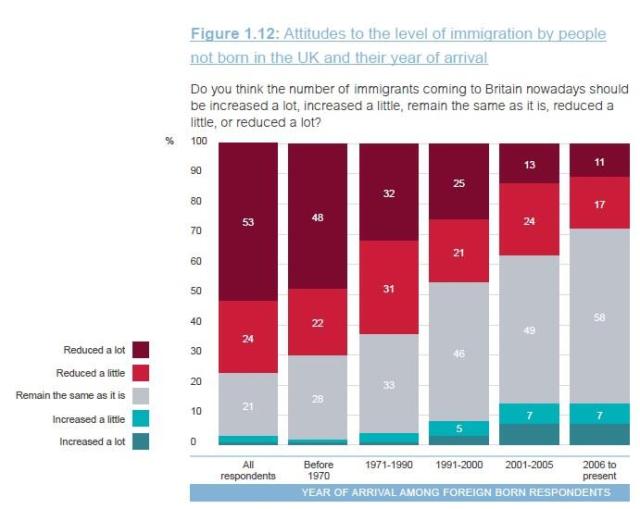
Via Sam Freedman
What the above, possibly slightly fuzzy, graph shows is that immigrants who arrived over 40 years ago (the second column from the left) are about as anti-immigrant as the Brits are on average (the far left column). This is good news in a way. Since it goes to show that sooner or later immigrants to assimilate. Of course, the bad news is that they end up just like us.
Perhaps slavs are more cosmopolitan than Jamaicans, but this just shows older people become more reactionary as they age and that become tend to become more like their peers. In this country that means being anti-immigrant, even if you’re an immigrant. The cognitive dissonance is worth it to fit in and have something to moan about. I empathise, I really do.
You might realise it, but this segues nicely into the government’s incredible plan to introduce prison sentences of 100 years of more in place of life sentences. The sentences need replacing because the European Court of Human Rights has told them life sentences without parole are no longer legal. To skirt this the Coalition are proposing a technical fix in which nothing changes.
Somebody needs to tell the coalition that being technically right only matters at a pub quiz. I’m not a lawyer, but I have a feeling being technically right will enamour them to the ECtHR in the same way being technically right will enamour you to your family in a Trivial Pursuit game at Christmas.
The link is that people change and people die and that by the time you’ve reached old age there isn’t a lot of the young you left.I’m glad Noah Smith has written this, because I had the same idea, but he’s written it up in a much better way than I ever could. Change is death. I’m not much like I was 10 years ago, and I will probably be as different again in 10 more. He writes that this means that there’s not much to fear in dying one day, because you already have. But this view of the world makes dying in prison all the more terrifying.
The man who dies after decades in prison isn’t the same one who murdered another, because they died long before them. If you’re an old Jamaican immigrant you complain about scroungers to your #hardworking Bulgarian nurse and look silly. Under the coalition’s proposed plans, if you’re a prisoner then your old body and older mind will be locked up for good. I can find no solace or justice in that.
4 charts that prove you know nothing about the housing market
As we all know, Thatcher privatised our housing stock and pocketed the funds. She made billions from Right to Buy and we provided billions in subsidy to the already well-to-do, but she didn’t bother to build any more houses so we got screwed. That’s where our housing problem comes from. A picture tells a thousand words and a big white space probably tells even more:
But not so fast! It might look like a lot of housing is getting built after the war, but that’s misleading. As not so many of us know, we didn’t just build lots of housing, we cleared slums on a vast scale. 15% of the UK’s population was affected and the overall building rate looks a lot less impressive. The blue line (via Neal Hudson) shows the net effect.
 The post-war years still look good, but at a lot less stellar. Thatcherism doesn’t come out of this well, but New Labour? They look good. Which was news to me, as I’m sure it’s news to you. the housing stock expanding at its fastest rate for decades during the mid-2000s…despite us…not really building many houses. “Hang on, how does that work?” you’ll be asking. “Don’t worry.” I say, “this is 2014 and all explanations now come in chart format!”
The post-war years still look good, but at a lot less stellar. Thatcherism doesn’t come out of this well, but New Labour? They look good. Which was news to me, as I’m sure it’s news to you. the housing stock expanding at its fastest rate for decades during the mid-2000s…despite us…not really building many houses. “Hang on, how does that work?” you’ll be asking. “Don’t worry.” I say, “this is 2014 and all explanations now come in chart format!”
What this graph shows, again from Neal Hudson, is that houses were being built, but they were also being subdivided and other stock was being brought into use. Houses were cut in half (or more) and commercial properties were converted. The high prices that tight housing supply created actually caused the number of terraced houses in London to decrease from 2001-2011, such was the rate of flat conversions. So New Labour did have a solution and it was high prices. But it would be remiss to blame New Labour, when you can blame Old Labour. There’s bipartisan support for that.
Not so fast! As a different all of us know, it was the Town and Country Planning Act of 1947 that caused the housing shortage. The 1930s saw a phenomenal rate of private home building, far in excess of anything achieved before or since, only brought to a standstill by Hitler and rearmament. Private builders can build lots of housing and the Planning Act is one reason they didn’t when the state stopped building. But there’s no wishing away the Planning Act for a magical return to the 1930s.
“Build more houses” is a good rally cry, but how? NIMBYs have rights. These rights are property rights. When they bought their houses they also bought the right to block other building nearby. This wasn’t a mistake, this is what they were told and what people consider normal. That’s a right in anyone’s book. If we want to build more housing we will have to expropriate them or buy them. And they ain’t selling cheap.
You know nothing about the housing crisis and that any easy solution you have is wrong (except maybe a simple plan). You should also realise there’s no libertarian solution to the housing crisis through deregulation. These rights are held inalienable. The same rights block a social democratic solution of more council housing. The only thing that remains is a Stalinist solution: the socialisation of property rights and the liquidation of NIMBYs as a class.
If you want to blame Attlee, Blair or Thatcher for the housing crisis you haven’t been paying attention. And you’re not nearly being ambitious enough with your cliches. The real villain behind the housing crisis, if there is one, is Hitler. And like Hitler the only solution will be Stalin.
UPDATE: Now with bonus chart!
@leftoutside also population growth had almost ground to a halt by early 1980s — MJT (@mjturner1975) January 3, 2014
A very good point, and one which partially vindicates the slowdown in homebuilding in the 1980s (although not its continual stagnation). The below chart shows the deceleration, stall and gradual increase in population growth from 1960-2010. 
Merry Christmas everyone!
A propos this, I thought I’d also say Merry Christmas.
Thank you for sticking around as this blog’s changed and my output has declined and become more erratic. I still love writing but I’m more cynical than ever before, and it can be easier to get that out of my system on twitter. I was going to post a spirited defence of Love, Actually but I can’t be actually be bothered now, too much food to eat, drinks to sink and friends and family to see. So until 2014 (or until I get bored of my family) have a Merry Christmas and a Happy New Year.



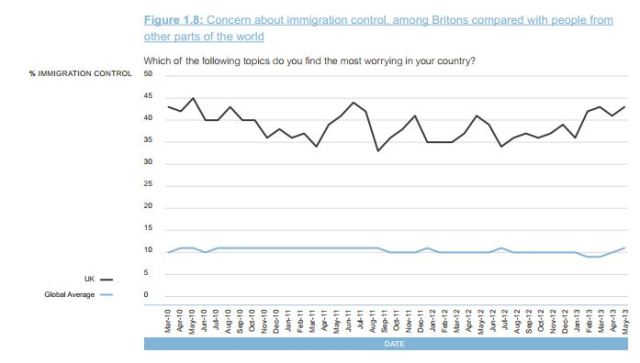
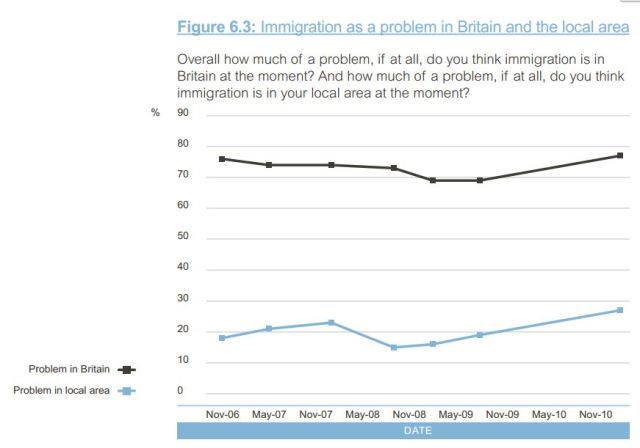
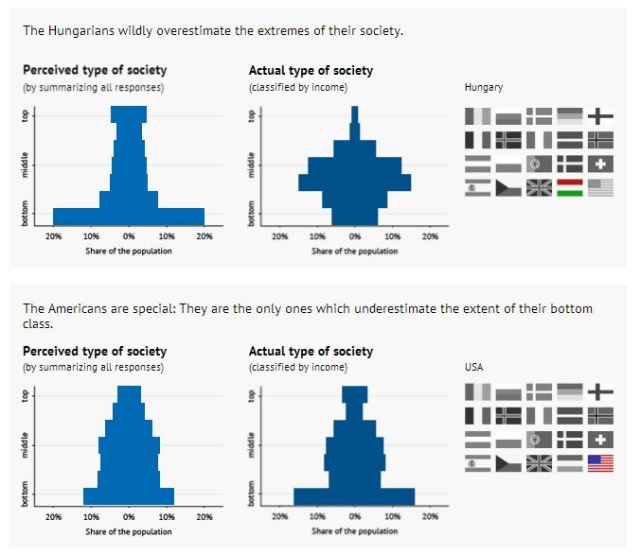
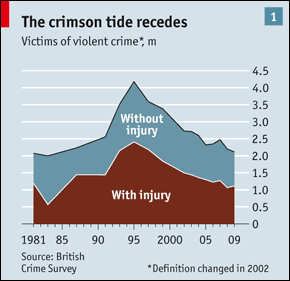

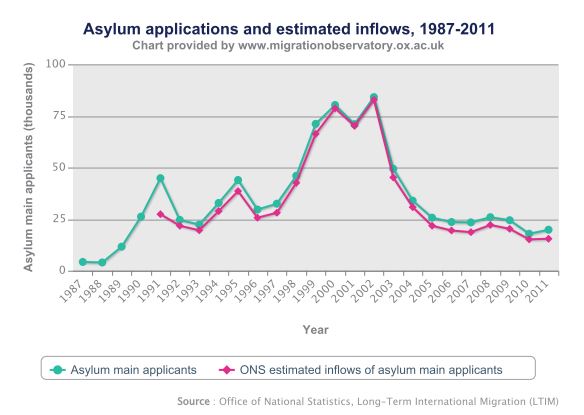
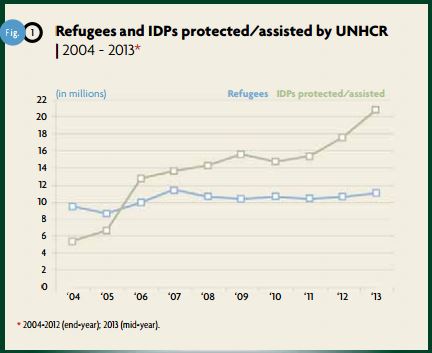
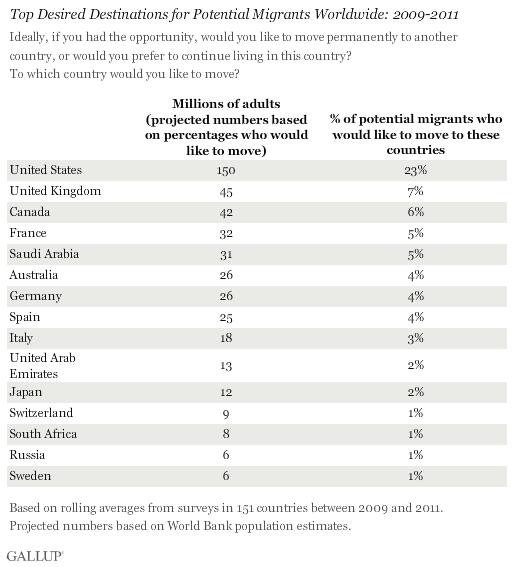

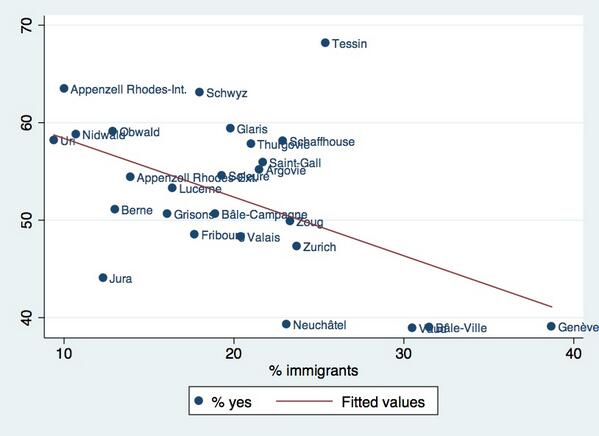
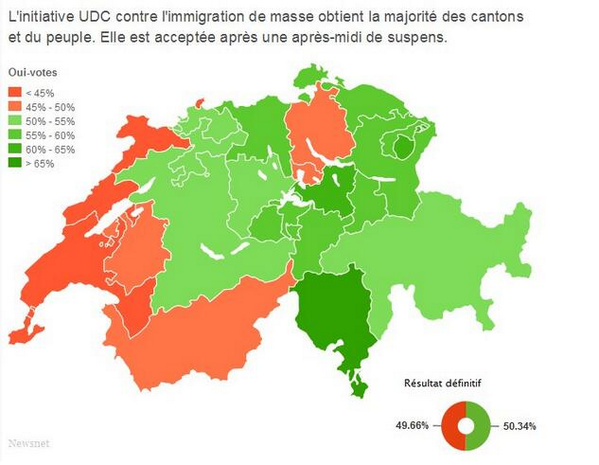
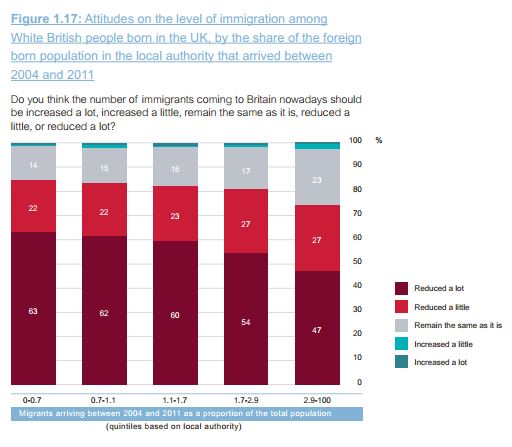

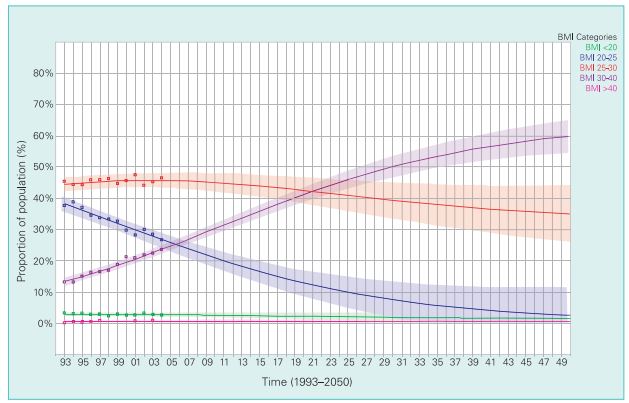
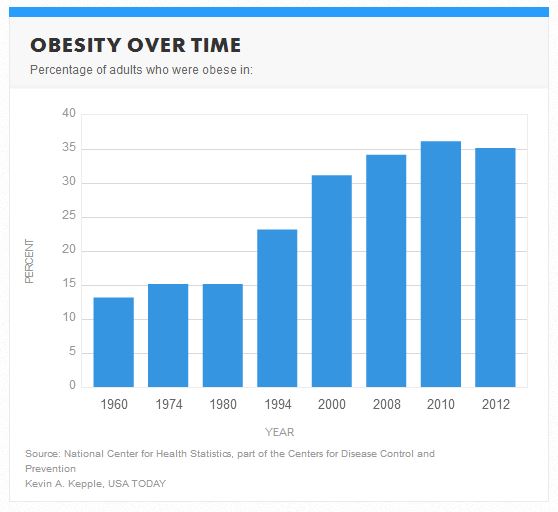
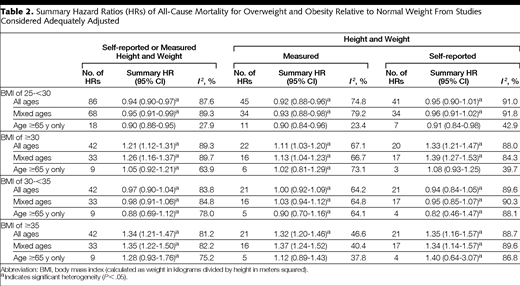


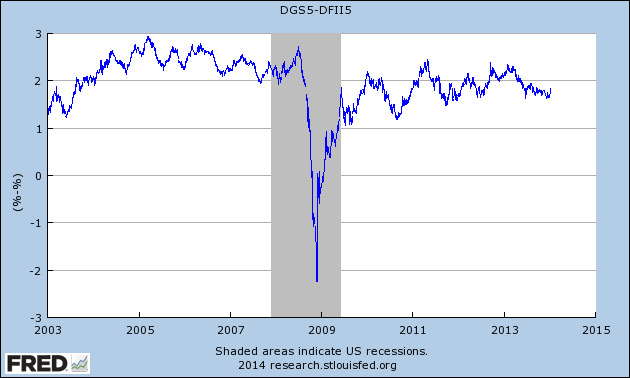


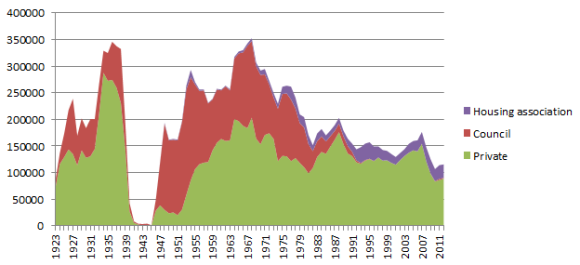
You must be logged in to post a comment.